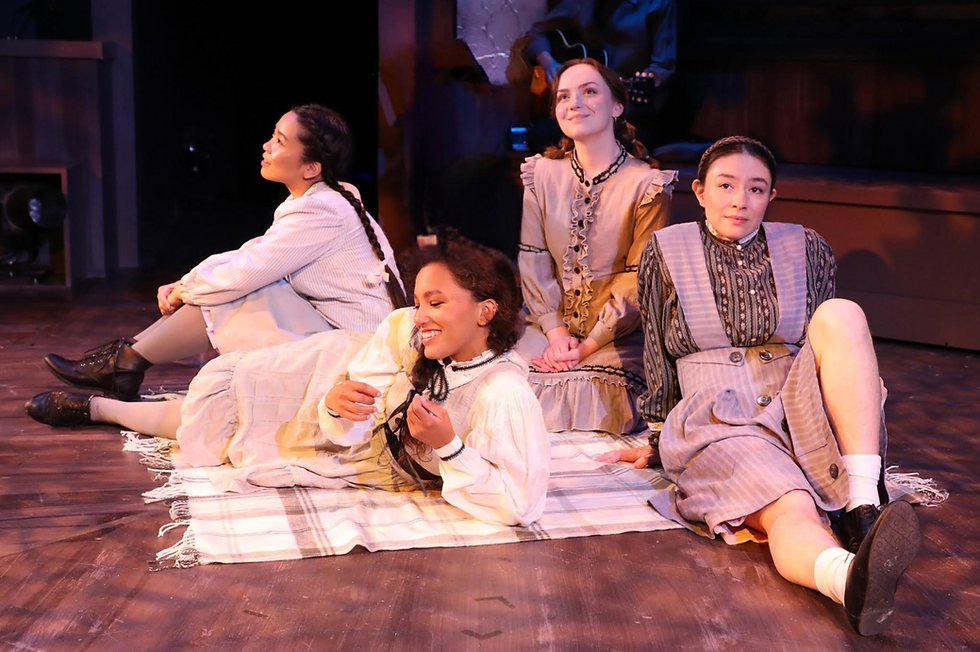Chance Theater deftly stages ‘The Curious Incident of the Dog in the Night-Time’
- Anita W. Harris

- Oct 3, 2023
- 4 min read
Updated: Jul 12, 2025

Chance Theater’s “The Curious Incident of the Dog in the Night-Time,” continuing through Oct. 22, offers a compelling glimpse into the life of an autistic boy. As directed by Darryl B. Hovis, the production evocatively engages sound and music, video projection, creative staging and an excellent ensemble cast to bring the suspenseful story to life.
Simon Stephens adapted his 2014 Tony Award-winning play from Mark Haddon’s best-selling novel, faithfully dramatizing the story as told by its 15-year-old protagonist. On stage, though, we see and hear the adults in the boy’s life as well, effectively balancing our empathy for him with sympathy for their frustrations in caring for a boy who barely allows himself to be touched, let alone return their affections. The most he can do is trust them not to hurt him.
But from viscerally experiencing the boy’s actions, thoughts and feelings, we understand that while not everyone is capable of responding to others in “normal” human ways, they may still be capable of remarkable human achievements given the compassionate care of others.

Christopher Boone (excellently embodied by Aaron Lipp) is an autistic math prodigy attending a special-needs school in Swindon, England. His rather saintly teacher Siobhan (a clear and emotive Rachel Oliveros Catalano) encourages him to write down his recent experiences in a book that she reads aloud, effectively narrating context for the dual mysteries that unfold.
Christopher is upset that his neighbor’s dog Wellington has been mysteriously killed in the night with a garden pitchfork (the dead dog evoked by a projected outline). The boy takes it upon himself to methodically investigate who “murdered” the animal, pushing him well beyond his comfort zone in going door-to-door to interview the “strangers” who test his sensory limits and fears of being hurt.
Along the way, Christopher discovers hidden in his very own home an even deeper truth about his parents that would be earthshattering for anyone, much less a young man for whom emotions and lies—with which the adults around positively drip—are completely foreign and cause him extreme physical anguish.

Circumstances force Christopher to take a harrowing (for him) train journey to London, navigating throngs of people and their audio and visual noise that constantly threaten to overwhelm him. It is only the (not necessarily kind) responses of strangers that get him through, and the commitment of his caretakers that offers him even a chance at more than just survival.
Music and other sound effects (designed by Hovis) effectively convey Christopher’s internal experience, as do well-timed lighting effects (Andrea Heilman) and vivid video projection (designed by Nick Santiago, with scenic design by Bruce Goodrich), which include facial-expression emojis and immersive scenes of deep space, where Christopher longs to go, not just for science but to be blissfully alone.

The ensemble cast work well together in portraying the adults in Christopher’s life, fluidly transitioning to become the other people and even objects (doors, tables, a beer-dispensing fridge) he encounters.
The actors also observe intently from the back of the stage when not in character—mirroring the audience—and help dramatize Christopher’s thoughts and feelings like an internal chorus by echoing his movements.
As Christopher’s handyman father, Casey Long strikes a balance between gruffness and gentle caring for his son. Karen O’Hanlon is similarly believable as his mother Judy, an emotional yet anxious woman simply trying to do her best.

The rest of the cast—Holly Jeanne, Jonathon Lamer, Jared Machado and Rachel McLaughlan—capably switch among various roles, with the quick-change aid of costume designer Adriana Lámbarri and dialect coach Glenda Morgan Brown.
Jeanne is especially immersed in all her characters, especially Mrs. Alexander, Christopher’s colorful and verbose neighbor. And Machado inhabits his characters’ accents and demeanors in particularly enjoyable ways, from a young police officer to stodgy older priest.
Though consistently engaging, the play must cover a lot from the book, including Christopher’s story becoming a school drama, making the play feel slightly long at times and episodic post-intermission.
But the intricacies of Christopher’s thoughts and what happens to him and those who love and believe in him—despite his inability to reciprocate—are what make Chance’s production of “The Curious Incident of the Dog in the Night-Time” so richly powerful and worth experiencing.
“The Curious Incident of the Dog in the Night-Time” continues through Oct. 22 at Chance Theater, 5522 E. La Palma Ave., Anaheim. Each performance includes a post-show conversation. The theater will host a Neurodiversity Community Night on Oct. 13 and “relaxed atmosphere” performances on Oct. 13 and Oct. 21. For tickets and information, call (888) 455-4212 or visit ChanceTheatre.com. Run time is 2 hours and 30 minutes, including intermission.



Comments